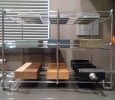How do you clean and maintain your water and diamond stones after use?
How do you store them to keep them dry, corrosion free, and not grating against each other?
What I've been doing to clean and maintain: After each sharpening, rinse off with water. If a lot of loaded gunk, use Bar Keepers Friend and a scotch pad.
How do you store them to keep them dry, corrosion free, and not grating against each other?
What I've been doing to clean and maintain: After each sharpening, rinse off with water. If a lot of loaded gunk, use Bar Keepers Friend and a scotch pad.

